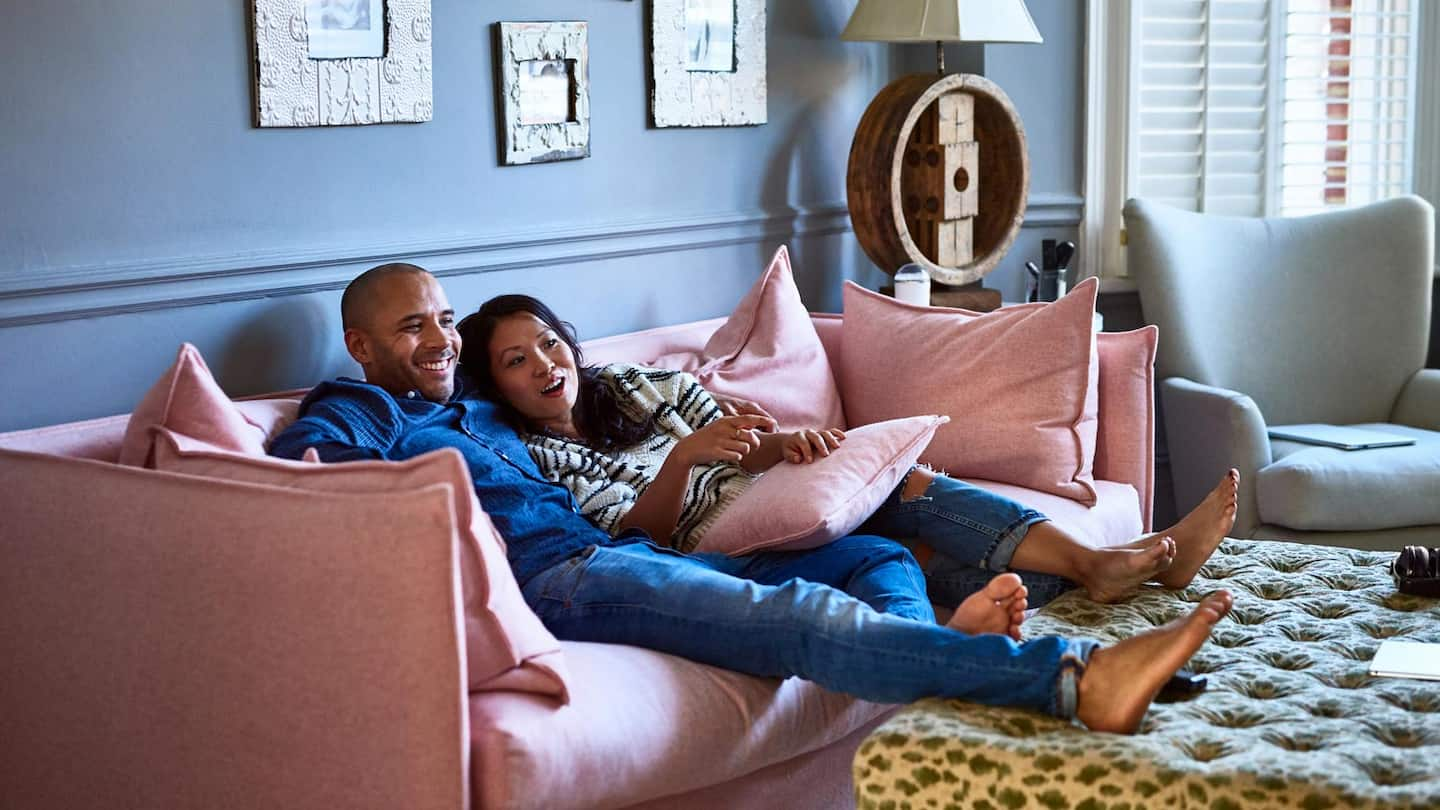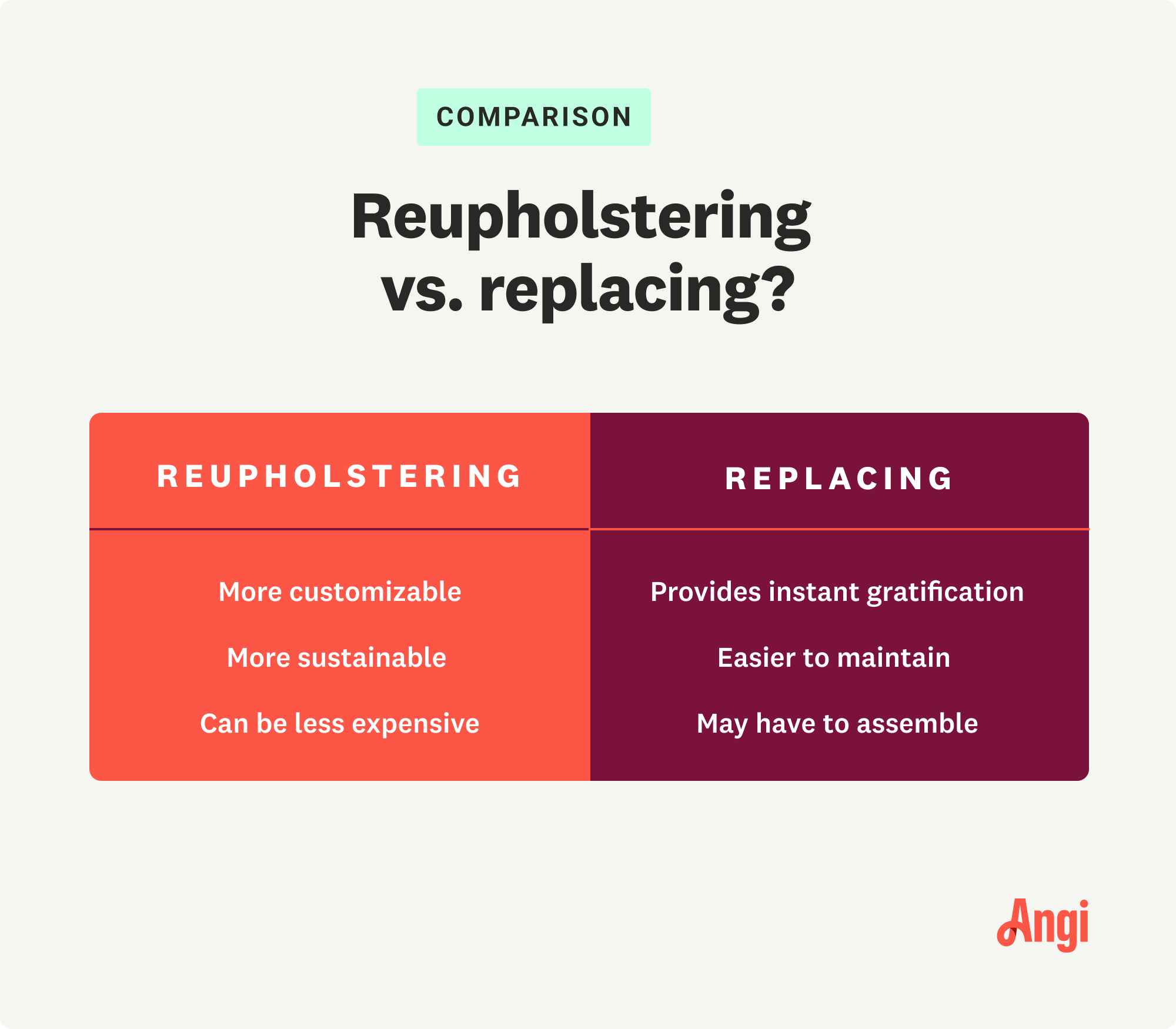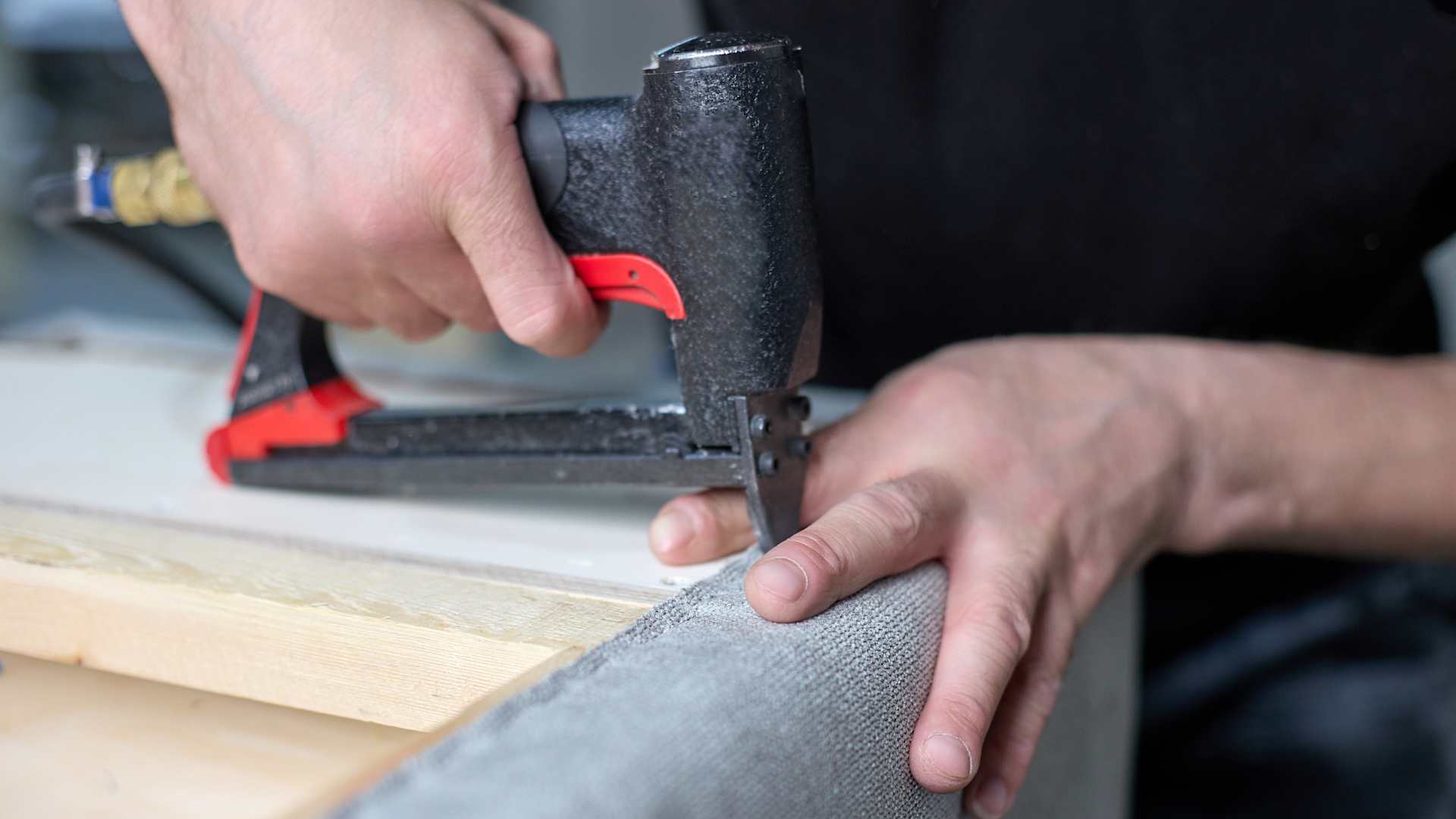
Learning how much it costs to refelt a pool table is the first step to getting your game back in top shape. Here's what to know about each type of table.
Know when to recover and when it’s time to find another


It costs $600–$4,000 to repair a sofa.
Expect to pay $370–$1,100 for small and large upholstery repairs.
Buying new furniture will instantly update your space.
When your favorite couch or cushion inevitably begins to falter, it’s not uncommon to wonder if you should reupholster or buy new furniture. Both options come with pros and cons, and the best one for your needs depends entirely on your personal situation. Use this guide to determine when it’s time to say goodbye to the old and hello to the new or if your current furniture deserves a second chance.

Reupholstering might be your best option if you can’t imagine parting with a family heirloom or want to save on costs by fixing minor fabric damages rather than buying new furniture. But in some cases, it can be just as (if not more) expensive to repair than replace. These are some of the upsides and downsides to reupholstering.
Many antique furnishings feature design elements and fabric patterns that can be hard to replace or recreate. But reupholstering is an excellent way to restore them to their original glory. To really make them shine like new, consider restoring or refinishing the non-fabric elements of the furniture. Once you consult a top-rated reupholstery pro near you, you may come to find that a certain piece just needs to be cleaned.
Though reupholstering can be a cost-effective alternative to buying new furniture—especially if you do it yourself—it's not always the less expensive option. More extensive repairs can cost as much as buying an entirely new piece, whereas minor repairs are usually more affordable and almost always worthwhile. On average, you'll pay $370 to $1,100 for the range of small and large upholstery repairs.
Unless you have the budget and time to work with a local furniture designer to create a custom object, reupholstering is the easier way to add a special touch to your favorite furnishings. Hire a quality upholstery pro to update an old-fashioned wingback chair with a lively, modern fabric. Or grab a needle and some string and customize a worn-out cushion all on your own.
If you need to gut a couch entirely, you'll probably spend more on the upholstery fabric required to restore it than you would on a brand-new sofa purchase. On the flip side, fixing something small, like a dining room chair, will almost always be more affordable. And using a slipcover to refresh a threadbare piece can cost even less.
Buying new furniture also comes with a handful of upsides and downsides. These are a few reasons why you might want to swap out old for new.
Nothing changes a space faster than adding a new piece of furniture. If a room feels dated or tired, the crisp lines and cozy colors of modern designs will bring it into the 21st century in a matter of moments. Make a den feel cozy with a soft velvet armchair. Or invest in a dark leather loveseat to ground an airy space.
Finding furnishing that feels like it belongs in your home is no easy feat. A new sofa or armchair may have looked great in the store but feel totally out of place in your home. If you’re lucky enough to have already found something that fits neatly in your space, reupholstering will ensure you don’t need to find something new.
Furniture cost is all over the map, with some small pieces costing as little as $10 to $20 and other large ones up to thousands of dollars. When you're determining whether to reupholster or buy new, find out how much each option will cost for the piece of furniture you had in mind.
For example, the cost to repair a sofa ranges from $600 to $4,000, which is roughly equivalent to what you’ll pay for one that’s brand new. But fixing a chair seat can be anywhere from $50 to $2,000, so you may find that it could be more affordable than buying new.
Though reupholstering is DIYable, most people leave this task to the pros. On the other hand, many modern furniture purchases require assembly, which means that buying new may actually include additional work for you.

When it comes to deciding whether to reupholster or buy new furniture, assess the following categories to help you make the right choice.
Reupholstering and buying new furniture both can be visually appealing, depending on your personal preference. Reupholstering might be the better option for an antique lover, but a new piece could just as easily suit their tastes. On the flip side, someone who's usually a fan of newer items could fall in love with a chaise lounge from another time.
Most visually appealing: Tie
Reupholstering gives you more freedom to decide what you want a piece of furniture to look like, because it’s a perfect opportunity to swap an old fabric out for a new one. Though it’s possible to reimagine certain prefabricated items (like build-it-yourself IKEA couches and chairs), you’ll have more success customizing pre-existing furnishing.
Easiest to customize: Reupholstery
New furniture and reupholstered antique or vintage furniture can be equally durable, depending on how they were first made and what they’re made with, as well as and how they’re maintained. A flimsy armchair will be flimsy whether you buy it new or reupholster it years later. But even a sturdy one still needs attention and care to stand the test of time, no matter whether it’s new or old.
Most durable: Tie (depends on the furniture)
There isn't much difference in cost between reupholstering and buying new furniture unless you're DIYing the former. Supplying your own materials and reupholstering a piece on your own will cut in half what you'd typically pay a pro. Otherwise, you can expect to spend around the same amount with whichever option you choose.
Most affordable: Reupholstery
Many antique and vintage furniture requires more care and maintenance than modern-day objects because the furniture is older. You may need additional tools and materials, like a gentle vacuum to safely clean delicate fabrics and paste wax to protect wood elements. On the other hand, a quick dusting and polishing may be enough for newer furnishings.
Easiest to maintain: New furniture
Reupholstering is a great way to turn what might’ve once seemed like trash into treasure—and an eco-friendly alternative to buying new furniture. Make the process even more sustainable by replacing old fabric with biodegradable materials, like cotton and silk. And use any fabric you have left over to make something entirely new.
Most sustainable: Reupholstery
My brother got information on this company while at the Garden Show at Cincinnati's Duke Energy Center a few weeks ago. A representative he spoke to suggested taking pictures of the chair he wanted re-upholstered and sending it to them via email for an estimate. He took pictures of the...
UPHOLSTERED 2 CHAIRS, DID AN EXCELLENT JOB
From average costs to expert advice, get all the answers you need to get your job done.

Learning how much it costs to refelt a pool table is the first step to getting your game back in top shape. Here's what to know about each type of table.

Discover the cost to reupholster a couch in 2025, including average prices, key cost factors, and tips to help you budget for your next upholstery project.